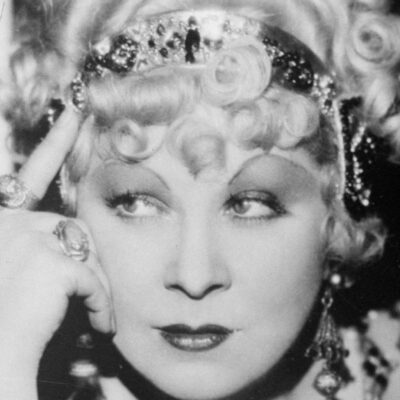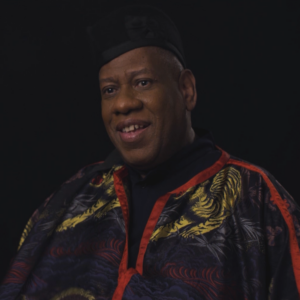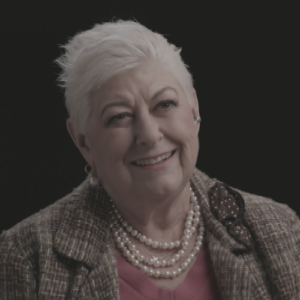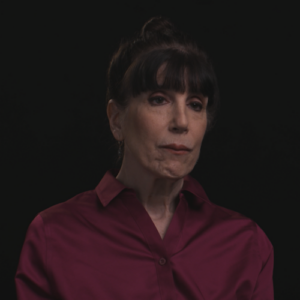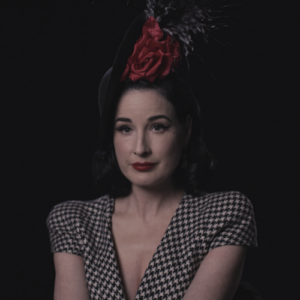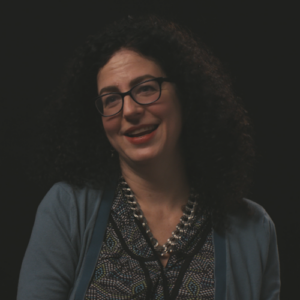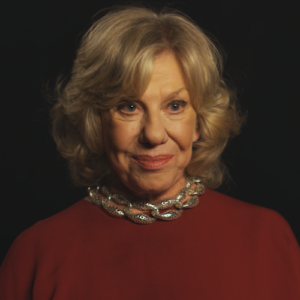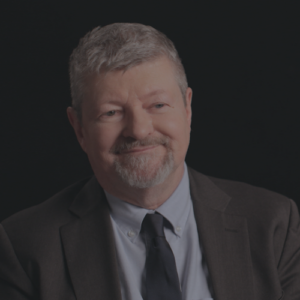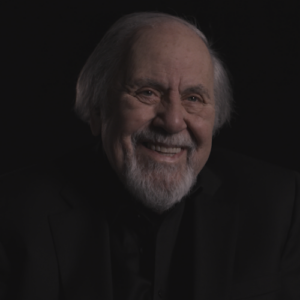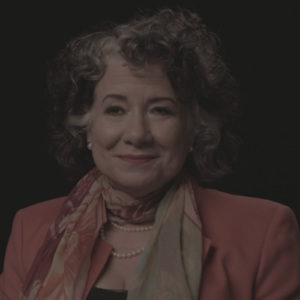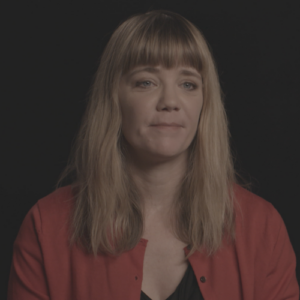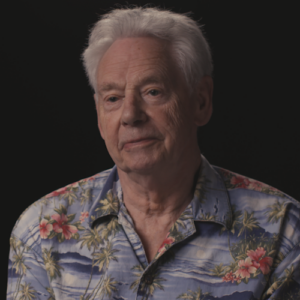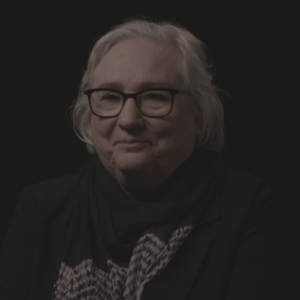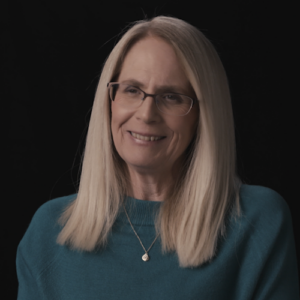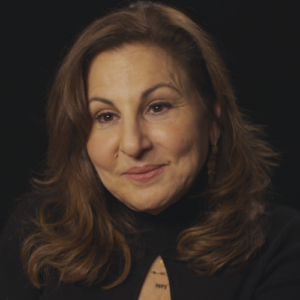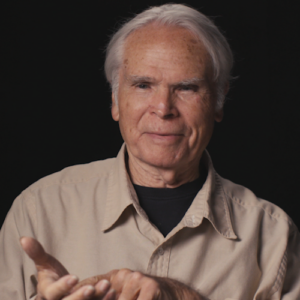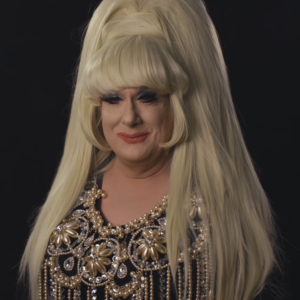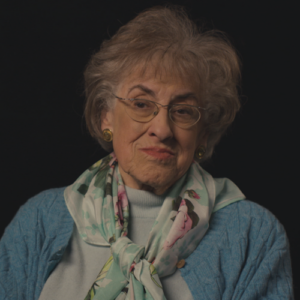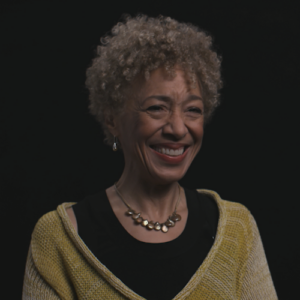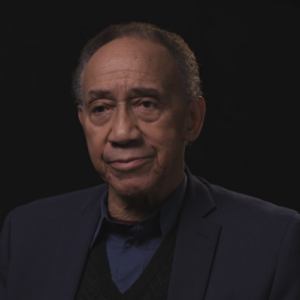Margaret Cho: I think I became aware of Mae West probably around the same time that I became aware of, like the Three Stooges or The Little Rascals or W.C. Fields, you know, in the seventies when I was growing up. They they spent a lot of time on TV. You know, there was a big heyday, a big resurgence of like Mack Sennett films and everything that they would play in between cartoons. And so it was almost like your first introduction to filmmaking. That was narrative that was outside of animation that almost had some of the same qualities of animation. So, you know, silent films, silent film comedies. That’s the world of Mae West, and that’s sort of what I sort of associated with her this time period that was kind of far off, but seemed still pretty current there. There in that world was Laurel and Hardy and Abbott and Costello and the Marx Brothers and. And Mae West was just another one of those great comedians from back then.
Interviewer: That’s, you know, I never thought about it but that. So she does have qualities that are very kind of similar to I mean that’s probably why they there are so many animated versions of her.
Margaret Cho: Yeah. I mean, I think that Mae West is so inimitable, you know, that she has these kind of qualities of like a goddess and a sexpot. But there’s something also quite tame about it, very innocent about it that lends itself to drawings and art. You know, that that you could almost tell those stories and in thought bubbles and like a comic book. It’s almost like she is like almost like a comic book superhero.
Interviewer: So how would you describe her to somebody who had never heard of her?
Margaret Cho: I think I would describe Mae West to somebody who’s never heard of her as a kind of a goddess archetype. She’s, in a way, a kind of maternal, but sexual being, that there is something about her that really you anticipate comfort in her body, in her manner or in her style. She’s, of course, desirable, but in a lot of ways, the desire, the danger of desire, discomfort, all is neutralized by this incredible maternal quality, not matronly, but maternal. So there’s a safety in there, which I think is quite unique because, you know, when we think of our screen blonds, oftentimes they’re quite tragic. Even if they are somewhat heroic in in their lives, they they live short ones. Whereas Mae West lived quite a long life. And so, you know, if you compare her to Marilyn Monroe or Jean Harlow or anybody that you think of these like fatalistic blonds. You don’t look at Mae West as fatalistic. You think of her as really somebody who survived. So I feel like you would describe her as a golden screen goddess who kind of had a longevity that most those screen goddesses didn’t have.
Interviewer: That’s really true. So she wasn’t a standup comic. Would you still consider her a comedian.
Margaret Cho: Even though Mae West wasn’t considered a stand up comedian? I think that she was definitely burlesque comedian. I think that, you know, her persona and her her message really was just about freedom, sexual freedom, sex feels good. Let’s enjoy this together. And all of that, that that kind of lends itself to a kind of comic figure. So she definitely was a figure in burlesque, a figure in society’s mind of taking sex and all of these social mores a little more lightly. So, yes, there there’s different, I think, classifications of comedian. She definitely is one.
Interviewer: You know, she did do burlesque in the late teens, early twenties, but she would never admit to it. But burlesque then meant something very different.
Margaret Cho: I think when Mae West did Burlesque, it was very controversial because burlesque is really a very potent form of political satire and social commentary. You know, and you’re not just talking about body images of women. You’re not just talking about sex, but you’re talking about the way the world is and how you would like to change it. And you’re poking fun at everything and everybody. And so burlesque has a lot of different connotations to it, that it’s dangerous, that it’s really critical of society and it’s very sexual. And all of these things prompted so many things in film. You know, they really like were always trying to change or tone things down. In her era with the Hays Code, trying to bring in what we can see in film or we can’t. And Mae West inspired a lot of that. And part of that is because of this burlesque persona, even though she didn’t admit to being a burlesque dancer, a performer, that that there burlesque perform performer was in there and you could not deny it.
Interviewer: Yeah. You know, it’s interesting with the Hays Code. It seems like there were there were women doing these very sexual roles, but they weren’t in charge of the film the way she was. She wasn’t writing. I think there’s something very threatening about that.
Margaret Cho: I think Mae West was really unique because she was the author of all of her work and she was bringing her self promoted, being on to the screen. It wasn’t as if she had been scouted by various producers and found and brought, you know, had like her hair, peroxide, blond and brought onto the set like it was not a thing where she was discovered or anything. She promoted herself all the way up there and wrote her own scripts and wrote her own way into the pictures. It was a totally different origin story and there was a maturity there and a kind of agency that none of these starlets had. And especially at that time, it was incredibly rare for a woman to write her own future in the same way.
Interviewer: You know, she and the things that she’s writing and think she’s joking about, you know, nobody else is joking about sex at that point. Why is taboo comedy important? Why is it important for comedians to push the envelope?
Margaret Cho: I think it’s important for comedians to push the envelope because it’s our job in society to that’s kind of what we’re supposed to do, that we’re supposed to really be critical of society and be provocateurs. That that’s kind of the nature of comedy itself. And I think it comes from like being the court jester and the one person that can speak out against the king without getting his head chopped off. Like, that’s kind of like what a comedian is supposed to do. Like, we’re supposed to be able to get away with talking about what’s going wrong or going right in society without having to be punished for it. And this, I think, is an important thing. Like this is an important role in society to take on. Some people do it with varying degrees of success. Some people go too far. And certainly nowadays in this, the sort of outrage culture that we live in, a lot of comedians overstep constantly, and that’s part of the fun of it and part of the danger of it.
Interviewer: So why is it so threatening when women joke about sex? It still is.
Margaret Cho: I think when women joke about sex, it’s threatening because we are I think in in in our being, we already are so empowered sexually that that it it’s it’s as if our our value is so high within the parameters of sex that if we weren’t contained by the patriarchy, it would be too much for men to handle. You know, and I think when somebody like Mae West comes along and is poking fun at male sexuality and poking fun at her own sexuality, here’s a woman that has almost too much power. So much so that’s unfathomable. And so somebody like her becomes very dangerous to the status quo because they’re questioning all of all of what we think about sex, all of the sort of puritanical ideals that are put in place to kind of hold women down and hold everybody accountable. So, you know, when we have somebody like Mae West, who’s a star also because of what she’s saying about sex and because of what she’s doing, then you have some that’s somebody very threatening, threatening the very state of affairs.
Interviewer: That’s so true. And I think there was I mean, especially I think even before she got to Hollywood, there was this sense of it sort of upending the natural order of things that people are comfortable with.
Margaret Cho: Right. I think when Mae West was performing in these burlesque houses, it was of course, people were buying into the danger of it and propelling her forward in her career because they want part of that danger. But when it goes from there to Hollywood, then it becomes like this ticking time bomb. You know, this is very scary. Like, we want we want to put this out there because, of course, it’s commercially viable. Everybody wants to be a part of this danger. But can we contain it? We don’t know. And I think that part of that, I think, is very invigorating, too. It’s it’s really electric when you find a talent like that and people want to want to purchase part of it and be a part of it, but they don’t want to pay the price.
Interviewer: That’s great. You’ve talked about the idea of the ethical slut. Can you explain that to me and tell me if, like falls into that category?
Margaret Cho: I think an ethical slut. Well, it’s an idea brought forth in the nineties by a lot of people who were polyamorous and who. We’re talking about finding a way to take the judgment out of having a very free sexual life to to take away these sort of like Christian values that we always put on people’s bodies and women’s bodies in particular, and take that away and allow somebody to just experience sexual pleasure without a sense of remorse or without a sense of needing to be monogamous, needing to be pious in any way, and, you know, like kind of like letting go of chastity and even like the societal norms of chastity, like marriage and like monogamy. And so an ethical slut is really somebody who is very open to sexuality of all its different forms, but does it in such a way that it’s not hurting anybody’s feelings, that it’s not, you know, bringing about jealousy, not courting jealousy, not I think not doing it to have power over somebody else. And so I think Mae West is a good example of that. She’s sort of been she takes on all comers, you know, and and takes everybody on with a sense of egalitarian prowess, like she’s going to do the same with everyone and everybody’s welcome and everybody’s equal, but nobody can stay the night like it’s like. She also keeps a distance from everybody with that kind of. I don’t know if it’s socialism, sexual, sexual, being, something like that, but it’s it’s almost like because she gives everybody the same. Everybody is also kept apart at the same time.
Interviewer: That’s great. You talk about the idea that I mean, for some women, for women, humor is a weapon in a different way. That maybe is for men.
Margaret Cho: I think women. Well, women who are funny are often really threatening to men because we already contain so much power within our bodies, within ourselves. You know, we have what everybody wants. It’s just the fact of biology. It’s just that men just need women’s bodies. They just want them. And they they are helpless to do anything about it. And when a woman has a sense of humor that can be used as a weapon that is sharpened and steely and scary, it’s almost like then women have too much power. You know, and so it’s one of those things like if a woman can laugh at a man, it’s it’s almost like the worst thing that she can do because it’s the most emasculating castrating thing, because it just goes to prove that it’s just like she can just laugh at him. And and, you know, that I think is the thing that men fear the most in, in a very primal way that that she will mock him and laugh at him. And so that I think when a woman has that much power, it’s quite terrifying to men, but also really appealing, you know, in that way. We love danger. We love what’s what’s scary to us.
Interviewer: Well, I did read that that growing up, you’re told, you know, don’t be too smart, don’t like them and think you’re smart. You’re going to scare them. Don’t make them. It’s going to make them look stupid. But, you know, Midwest humor was all about taking men down a peg and making them look stupid. So why does she get away with it?
Margaret Cho: I think that Mae West got away with being exceptional in standing in her power and making fun of men and and doing all this because she was doing it with humor that was really kind of turned back onto herself, like she was making fun of men, but also making fun of her own sexual prowess and her own sexual appetites. And there’s something really, I think, soft about that. You know, somebody who turns their humor around onto themselves, You know, that’s very disarming. And so it becomes less of kind of this aggressive thing and more like it’s like a cat. You’re like, I like toying with a cat. Like that to me is why she got away with it. I mean, there’s also, you know, that just the the kind of the source of it, you know, that she is this kind of got this womanly, velvety quality that that really is very appealing and and that softness, that femininity is undeniable. But there is like a maturity there, too. She always seemed older than she actually was, even though, you know, of course, she must have been pretty young all throughout, you know, the beginnings of her career. She seemed like she kind of. Had been around the block, which I think that’s highly unlikely for her age to think about that. So I think she sort of, you know, kind of put on that persona of being this experienced woman who knew everything and very worldly and and that in itself, there’s something that is really charming about that and disarming.
Interviewer: She was almost 40 when she did her first movie.
Margaret Cho: Oh, wow. So then if she was older, it’s it’s a trip because it’s like then she’s but she also seems kind of ageless, too. And in the much later, you know, then it’s like where where where is this going? Like, where does where does it end? It’s really interesting.
Interviewer: You know. What do you think of her taking this to taking this persona into her eighties the way she did?
Margaret Cho: I love it that she was still the sex bomb way into old age like that is really I mean, that’s how a goddess should be, though, you know that That’s really I mean, the goddess move is to just continue to live in that forever. You know, age is irrelevant. And I think that that’s a it’s a wonderful attitude. And, you know, we hope that we all get to be that way.
Interviewer: Is that the kind of the final frontier for them in terms of sex taboos, the sexuality of older women?
Margaret Cho: Well, I think that the sexuality of older women is is taboo, because we want to think of older women as not having to need it. Any of those things are not wanting to be sexual or or. But I don’t think that that is right. I feel like when you’re older, you know what you want sexually and your body is very familiar to you. And and that in itself is a sexy idea. You know, we have such a love for old male stars. You like you see all these, like, guys in movies and they’re like in their fifties, 6070s and beyond, you know, with the young girls. And it’s like, so weird. It’s like, why would you want a body that’s so much younger than you are? That, to me, is suspect. I always think, like you would want somebody that has the same kind of like sordid history with their body. And then you can compare battle scars. And that, to me, is far more sexy than kind of being with a young’un. You know, that’s so weird to even think about.
Interviewer: Yeah, it’s kind of I also think about somebody a lot younger who’s maybe you feel terrible about.
Margaret Cho: Yeah. Yeah, I just. If I was if I was with somebody younger, I would just be, like, kind of. Well, I think I would be frustrated because their lack of experience to me would just, you know, it would just be seem like a waste of time.
Interviewer: You know, you’ve talked about different forms of shaming, and it’s made definitely experienced in shaming. But in terms of the later movies like Sex, you know, for portraying this kind of sexually voracious older woman. What’s your take on that?
Margaret Cho: Well, I think that age shaming for Mae West and, you know, movies like Sex, Ted, and all of that, I mean, that’s just I think it’s it it’s just fear of female power. You know, It’s fear of well, it’s fear of aging that that and that sort of thing of like, if we can somehow discount her power because of her age, it it kind of like less is her power, but it really doesn’t at all. I mean, I think it’s just futile. I think that age shaming really is I mean, it’s something that it it doesn’t make sense to me, you know? And it it also it’s it’s kind of cheap. You know, it and it’s last state doesn’t really have a real sting.
Interviewer: Yeah, I agree with that. Jumping way back at Mae started out as a vaudevillian and, you know, she she created this persona and she honed it and performed it forever. And I’m sort of I’m curious what as a comedian, what do you think about that, the idea of kind of having one bit?
Margaret Cho: Well, I think that, you know, when you’re starting out as a vaudevillian, it’s very similar to being a comedian and you’re doing the same material over and over and you’re you’re kind of working out and perfecting your persona. And once you get to that perfected kind of state, then you’re kind of able to take it out. And, you know, anything that you get hit with, you’re going to be able to answer in that character. And so that is very familiar to me. You know, that’s kind of what all comedians do. And that’s really where we come from. We all come from vaudeville.
Interviewer: Huh. That’s interesting. That would be it. Well, she was she goes to Hollywood. She was really an outsider and both in terms of what she was doing, but also just socially, she never hung out with all the other sort of ladies of the day. And why is being an outsider important for comedy?
Margaret Cho: Well, I think comedy is really an outsider art form. And if you look at Hollywood at the time that Mae West was there, of course, she’s going to be the ultimate outsider. I mean, think about stars of the era. You know, you have the very enigmatic, I guess, Greta Garbo or even before that would be like Gloria Swanson, who were just kind of like they they were putting forth this image that was really not not one about like speaking, but it was really almost just like about not speaking. It was just this distance and this coldness. And Mary Pickford, who was just sort of America’s sweetheart, those kinds of actresses, they’re not going to have that same sort of voluptuous control that Mae West had, you know, And they’re not writing their scripts. They’re not they’re not actually putting forth their persona. They’re there to kind of like be assembled in the male gaze, whereas Mae West is writing her story. So it’s just a different thing. Of course, she’s going to be an outsider there. But most comedians are outsiders. Because comedians are looking out like from the outside looking in and pointing out what’s wrong with everything.
Interviewer: Being assembled by the male gaze. That’s sort of interesting for especially thinking of her as somebody who’s every aspect of her physical being was so intentional and honed. It seems sort of like the opposite of what was happening with other women where they were just sort of being styled.
Margaret Cho: Right. I think that like with Mae West is coming as the complete package already with words to say, with jokes at hand and with, you know, all of all of that sensuality, all of that body ness, all of that naughtiness. You know, it’s really almost as if you had to figure out how to how to handle that, you know, And that that, to me, I think, is much more powerful and fun.
Interviewer: You know, verbal wit, it’s so key to me. And you sort of talk more generally about just the power of words, like especially in terms of comedy.
Margaret Cho: I think the power of words is is you can never underestimate it, you know, And I think that, like what comedians have on their side is surprise, the element of surprise. And you can surprise people with what you’re saying. That’s really most of it. And I think because at the time, women were not expected to say anything, much less something witty. And so when Mae West is being incredibly witty and fast and on her feet and saying all these things that are outrageous and wise, but also really astute, you you just have like people just they’re their heads are going to blow up because they can’t believe what they’re saying.
Interviewer: So do women who write their own material have a power that that female actors who who just perform with their given don’t?
Margaret Cho: Well, I think that women who write their own material, it’s it’s in a different category. You know, you can’t really compare it for like actresses who are playing apart. It’s it’s not the same You know, women are comedians. We know what it’s like out there and we know how we have to portray ourselves in a certain way. And and really, our our job in the movie isn’t to get the guy. You know, we have a lot other of other things that we need to get done.
Interviewer: That’s great. So, you know, the first Broadway play that made doing a bunch of things on theater, she sort of in the chorus or whatever. And then 1926, she’s 33 years old and she writes a play for herself to star in on Broadway. It’s called Sex. And and she plays a sex worker who ends up living happily ever after with this great fiancee. And moralists are just enraged by it. What about that story is enraging to moralists.
Margaret Cho: I think that if you’re casting yourself as a sex worker and the plot isn’t there to be a morality lesson where you’re doomed to tragedy because of your choices, your poor choices in life. And you know, the narrative of the play doesn’t take you to hell, then people are going to have a problem with it. You know, it’s like, fine, if you’re a sex worker, but as long as you get killed, like they can’t take a sex worker who is able to just fall in love and maybe leave the profession, maybe not. You know, I mean, that is something that people want to take the moral high ground on and people still have. To this day, a very outdated notions about sex work and and the morality of it. You know? And whenever you see a sex worker come up in a movie, it’s always this thing of like, well, somebody’s got to rescue her or somebody’s got to do something that this is no life. This is not a life fit for a woman. But really, you know, Mae West was changing that script, you know, and that is very heroic. But of course, it’s going to make the moral police get very anxious.
Interviewer: That’s great. That’s that’s fantastic. They’re in the same play. There’s this there’s a high Society woman who does sex work for for kicks, basically. And Mae calls her out on it. You call that as a hypocrite? What is she saying there about societal norms.
Margaret Cho: Do you think? I think that, you know, when she’s calling this high society woman a hypocrite for doing sex work just for fun, I think that it’s kind of like, you know, you’re not brave enough to stand out and say, I like this for myself. I like this because I like sex. You know, that there’s this closeted view of having to be sexual like you. You have to be sexual in the closet. You have to be a sexual behind closed doors. And that is hypocritical if you’re looking down. Women like Mae West. That, of course, is a very hypocritical stance if you’re the one having the best time. You know, So it’s one of those things where it’s like, you know, that’s the right judgment. You know, that’s the right way to kind of go about that.
Interviewer: And she does a terrific mother played Diamond Lil, and she then resurrects this character in one of her big early movies. She does a run where she plays a former sex worker who now runs a saloon. And so she and actually and all her movie characters are kind of some variation on like the former sex worker who has made good and is now really in control of her destiny and her fortune. Why is this so revolutionary? The idea of the fallen woman who doesn’t pay for her sins.
Margaret Cho: Well, when when you have as a story where this fallen woman doesn’t pay for her sins, you are going against what it says in the Bible. In the Bible, women are continually punished. Just for curiosity. Just for, like, wanting to eat an apple. Even like Lot’s wife who just turns around to look at Sodom and Gomorrah exploding just because she turns around. It’s now it’s she’s a pillar of salt. Like there are so many instances in the Bible where women are just, you know, given the worst punishment, just for asking a question. And so when you have a woman who has wantonly and very depraved way done what she please with her life and her body and then, you know, is in a place where she can call her own shots and isn’t punished for what she did. That’s a very offensive thing to, you know, people who live and die by what the Bible says about women. You know, and and really, I mean, what’s so offensive is that the Bible really it it keeps women down in such a way that is so ridiculous and horrifying. It really like does not allow for women to ask questions to not be raped by God. Like, it’s like this is a whole thing, like the Bible and all that it sort of says about women and sexuality is so distorted and and twisted and wrong. And so that’s why when we have these sort of stories that kind of come up outside of, you know, thinking about the Bible, then, you know, people freak out.
Interviewer: So, yeah, in the middle of her Hollywood career, she goes on this very popular radio show and she does this skit, this Adam and Eve skit where she plays Eve of tempting Adam, and she was banned from the airwaves for ten years. And the FCC receives all these crazy complaints like, you know, how can you insult the Bible like that? How can you joke about the Bible? And I think it’s a really interesting idea that just that her whole kind of act is an affront to the Bible in a way.
Margaret Cho: Well, yeah. I mean, her whole being is an affront to the Bible because it’s just showing how ridiculous and stupid it is for women not to be able to ask questions. And, you know, her parodying that and being this temptress trying to get Adam to eat an apple is I mean, it’s just something that just shows how flawed the view of mankind and how we deal with women is. It’s it’s just making fun of it. And that is really too much for people to bear.
Interviewer: That’s great. So her first play, Sex. The one where she plays a sex worker, it’s very serious and it’s actually kind of angry. You know, like she says, at one point, all the bad in me has been put there by men. And and then the next play she does is all about drag queens. And then the play she does after that is where she really becomes who we know as Mae West. And so after she does the play with the drag queens, she’s all about the wit and the double entendre. What do you what do you make of that? How did working with the drag queens lead to, you know, sort of opening up this kind of vein of humor that she then worked in?
Margaret Cho: Well, I think drag is a wonderful example of when you parody humanity, you know, to be a woman and to kind of take on all of the the kind of feminine characteristics and to use that femininity as a kind of weapon to wield it in a way that’s very manly. I think that’s so courageous. And it’s one of the things that I really love about drag. You know, it’s taking kind of a male vigorous ferocity and and giving it a female like feline slant. And it’s incredibly appealing. And I think that, you know, you learn a lot as a woman and a comedian. You learn a lot from drag. I do certainly how to kind of wield all of those kind of. Weapons to your advantage. And so I think that that makes sense that she would learn a lot from drag queens. I always do. And I still do.
Interviewer: That’s great. Well, you know, like you, you know, me has always had a huge gay following. Um, what qualities make a woman a gay icon?
Margaret Cho: I think. What qualities make women a gay icon? It really goes back to a kind of veiled strength that comes forth in ways that are unexpected. You know, you have these huge cults that surround like Judy Garland and, of course, later Cher. And there is this sort of feeling of like, you know, these incredible beauties that were so unique and strong, but also, you know, with like Judy Garland, there was so many facets to her damage and her addictions and her childlike qualities and all of these things. But all throughout it, this like incredible voice and the strength to break through everything, all of the trials that life had put her through. And I think that with Cher, it’s a kind of thing of like the there’s somebody is incredibly unique and and statuesque and different and and who took this incredible like contralto voice and made it so willowy and feminine. You know, there are so many things like there are so many opposing forces that come in there. So it’s that like strength that’s wrapped up in something that’s totally unexpected that I think draws the gay male gaze, which is far more complex than a straight male gaze.
Interviewer: Well, that also makes sense because, you know, gay men love her in her later years and straight men are just repelled. Like, is it that gay men are seeing something different in her?
Margaret Cho: Well, I think gay men love the idea of the aging sex goddess. You know, that we love, like these kinds of characters, Like it’s like Rue McClanahan from Golden Girls. It’s like that Black Widow, the Graying Widow, which I think is so fabulous and so sexy and so fun, you know? So I think that there’s something potent about it. There’s something ridiculous and unique about it, and very decadent, too. So I feel like that as well. The surreal quality of that I think is really appealing to to the Queer Eye.
Interviewer: That’s great. She was very LGBTQ positive in 1927 for that era. What do you think of the idea that what’s very progressive in 1927 looks very different now? I mean, should we should we judge it by contemporary standards?
Margaret Cho: I don’t know. I mean, it’s almost like, how could you? Because it’s like the way that people thought about everything back then was just so restrictive and so informed by these very like kind of biblically like, you know, enforced rules. Like it’s a very strange mindset to grow up in and to have any kind of independence there is pretty revolutionary.
Interviewer: Well, it is sort of the same thing for feminism. I mean, she’s she’s seen as really kind of striking a blow for, you know, women’s independence in the twenties and thirties in the seventies. All these feminist are looking at her saying, you know, she’s not really one of us.
Margaret Cho: Well, I think feminism has gone through so many phases. You know, we kind of go into these ideas or these factions where all of the trappings of femininity become kind of articles of oppression, you know, and and then even sexuality itself or the ideas of sexuality or pornography. Then there’s a lot of people who start looking at it like that. Even that is is rape, you know, and I don’t agree with that. You know, I don’t like the puritanical views sometimes of feminists that I normally respect, but often have very different ideas than me on sexuality, on trans women, on porn, on being positive at all around sex in any way. So I think that, you know, it sort of depends on sort of the age in the era where your feminist kind of is drawn from like, I think that’s more kind of going to inform where you land or where you stand on all this stuff. I mean, I’m from like a very nineties, very sex positive, kind of like performance art sort of area of like, you know, sexuality is, is really something that we need. To survive and keep going and and to claim as our own. And so that that’s my form of it. But everybody has their own way of looking at feminism.
Interviewer: Is comedy a force for feminism?
Margaret Cho: Oh, comedy is definitely a force for feminism. I think it’s it’s really one of the most important things that we have as feminists, and it’s one of our most prized weapons.
Interviewer: So in terms of what is it like challenging the patriarchal structure?
Margaret Cho: I think it’s it’s like when a woman is adept at mockery, it’s like the scariest thing for men. And so in that way, we really have a leg up on it, you know, like it’s really it’s like they just don’t want to be laughed at. And that that is the one thing that we can do.
Interviewer: That’s great. Do entertainers have the power to bring change in a way that politicians don’t?
Margaret Cho: I think entertainers have a great power to bring change. I think that politicians obviously do. But it’s it’s kind of a different game. You know, with entertainers, there is the cloak of deniability. You can always kind of like like retreat from a strong message by saying, well, it’s just a show, it’s just a joke. It’s just art and and really kind of like soften the blow, which I think actually makes it more powerful. So there’s ways around it, you know, with entertainment. And of course, you see that probably more clearly whenever the country’s at war, you know, like you have it with all of like these kinds of like the the road to whatever movies with Bob Hope and Bing Crosby, you know, you have this sort of like learning to kind of deal with these world wars. And then you have all of the folk music of the sixties. You know, you have like social change being brought about by like the Smothers Brothers and Bob Dylan and Joan Baez. And, you know, you have this sort of way to, like, comment on society that you it’s deniable, too, because it’s just art, but it’s still very potent.
Interviewer: So this is purely speculation. But do you think Mae was trying to make a social statement or was it just funny?
Margaret Cho: Well, I think make is a social statement. I think Mae West is a social statement about the power of womanhood and the power of sexuality and female sexuality and the the terror people have around it and how we can calm down around it, you know, And I think that’s really, really, really powerful.
Interviewer: Um, there was this rumor throughout her entire life that she was a man. Um, why do you think why would people think that she’s.
Margaret Cho: I think that the rumor that Mae West is a man, it comes up quite often, you know? And also, there was another rumor that she had died and her brother was doing her her like that. Her brother was actually in six Tet. That’s a that’s another rumor. I think it’s just people don’t want to believe that a woman can do all of that. Can a woman do all that? Can a woman really do all that? And so you got to have that, like, weird mythology of like, oh, she’s actually not. I mean, of course it’s interesting to think about, but, you know, if she really was a man, we would have known, I think, much earlier.
Interviewer: That’s a great take on it. Actually, Edith Head, her costume designer, went out of her way to say she’s like, Look, I’ve seen it all. Yeah.
Margaret Cho: Yeah, she is a woman.
Interviewer: Um, she’s also been called a female impersonator. And there was this article in Vanity Fair, like 1934 or something. It says, Mae West is the greatest female impersonator of all time. I mean.
Margaret Cho: Yeah.
Interviewer: What is that about? Is she performing femininity?
Margaret Cho: Yeah. I mean, I think that when you’re calling Mae West of a female impersonator, you’re actually not that far off because there is a performative quality to her feminine way and that there there is a kind of, you know, there is a kind of like, I think, display of femininity that is so obvious and so big that it’s almost a parody of itself. And that’s what I think she embodies.
Interviewer: So, you know, we talk to George Schlatter this morning. That’s the first time anybody ever said that they actually thought she was sexy. Mm hmm. Well, it seems like people think, well, she wasn’t even she was so over the top trying to be sexy, But it wasn’t. That’s not what she was trying to do. It was a joke. Female comedians being sexy. It seems like that was part of what was so scary about her early on.
Margaret Cho: Right. I think that what is dangerous about Mae West is that she was sexy and that she was talking about being sexy and kind of knew what she was doing. She knew what she was talking about. And that that carnal knowledge that was so apparent, I think was a big threat. And that’s why I sort of people wanted to. Count like, Oh, well, she’s not really sexy because that’s it’s sort of like, you know, you don’t want to admit that you’re attracted to it because then it becomes dangerous, then it becomes potent and powerful. But I think in general, we don’t trust sexy women on stage in a way that’s comedic because there’s I mean, there’s ways you can get around it. You know, I think Marilyn Monroe got around it by being childlike. I think Judy Holliday got around it by acting childlike that there was this sort of perceived dumbness that kind of got through that. And this the sort of innocent sexuality became safe to play with because they almost didn’t know what they were doing, but which, of course they did. But, you know, it was a way to kind of like soften the blow of that. But with Mae West, it was this. She was very knowledgeable. She knew what she was doing. And that in itself was very terrifying for people.
Interviewer: So what what is her legacy?
Margaret Cho: I think Mae West legacy is really about being unabashed for your love of what is sensual or what your body tells you, what you enjoy, you know, and to take pleasure in that and to be able to kind of sit back and and really revel in that pleasure, I think that really her her legacy is really about comfort in and the laughter that that comes from your lover’s bed, you know, whatever that is, whoever that is, that that there is that that just really kind of wonderful humor that people who know each other’s bodies can can really like buy into. And I think that’s what what it’s all about.
Interviewer: How do you think is the today or in the past 30 years the closest to send it to me was.
Margaret Cho: The closest to send it to Mae West. I think nowadays I would I would say, you know, like I would look to somebody like Amy Schumer, you know, that really when she is talking about sexuality and and all of the different ways that she does enjoy it, you know, that that she also is very vocal about things she doesn’t like, which I think is in the spirit of Mae West. Very much so. Other people, I think, you know, somebody like Mo’Nique who is very, very open about her open marriage and that, you know, she is a very sort of mature sexuality in it and talks about how has been good to her. That’s always you know, to me, that’s like, oh, there’s there’s kind of Mae West in there, too. There’s no knowledge this worldliness even a bit of her rebelliousness to as as a as a showbusiness kind of entity that that I think it sparks comparison. I would say that kind of deep sensuality is rare. You know I wouldn’t I wouldn’t know if any other performer would really have that in the same way. It’s something that’s dangerous and it’s something that you only see glimpses of here and there, but it’s always very appreciated.
Interviewer: So what about her is inspiring to you personally?
Margaret Cho: I think Mae West is inspiring because of her legacy, her image, her longevity and her spirit. It’s great to be that vital and sexual into that age. You know, I think that’s really incredible and really something to try to get to. You know, that would be great.
Interviewer: I mean, I guess you sort of celebrate anything by your own comedy and how you’ve bee inspired to in that sex positive, you know theme.
Margaret Cho: Well, I think like what what I was you know, when I started doing comedy even before I was sexual. And then, you know, when I was talking about sex, even kind of before I was sexual, I was almost trying to write out what I wanted my sex life to be as a younger person. Kind of like looking towards like at the beginning of my twenties, I was talking about sex in a way of, like, aspirational. Like, I want to be able to be this and this and this. I want to be able to enjoy the fact that I’m attracted to this, this, this, this, this and and that. I’m manifesting these kinds of relationships, which I think I did to some degree. So I think that a lot of it comes from the artist’s desire to, like, push forth, like what is this persona going to do? And then it manifesting itself.
Interviewer: Do you think that female comedians have a pressure when they talk about sex to sort of be self-deprecating? Because, you know, Amy Schumer Sort of. Makes fun of herself a little bit around it, which Mae West would never do.
Margaret Cho: I think that female comedians definitely do have almost a caveat of having to be somehow apologetic about their sex lives, that they have to kind of say, well, you know, it’s almost as if they have to, like, really come up against this sort of judgmental society, is going to take issue with them enjoying themselves or enjoying their bodies or some I’m not complaining about it or not, if their bodies don’t match up to society ideals, that that’s a very acceptable thing to talk about, not enjoying what you have. And and in that case, I think you know that somewhat for me is something that I think is really like an outdated argument. You know, I don’t I don’t feel like I need to discount my own sexuality and my own beauty because I get enough of that from the world. And so I find like if I can just pump up my own volume, I can feel better about it. And again, it’s sort of an aspirational thing, like, I want to talk about something else and make it true. Like if I talk about how good I feel in my skin, maybe someday it really will be true. And then I feel like, Oh, actually has happened like that. And.
Interviewer: You know, that’s something that it’s like maybe the one thing that is kind of lacking from her is any kind of vulnerability. Mm hmm. But it’s still funny.
Margaret Cho: But I think the vulnerability vulnerability is overrated. And also, it’s like when you’re like a woman, you know, and you’re like in the 1920s, thirties, kind of like coming out, being this persona in a very, very restrictive time for women. It’s. It’s pretty amazing. Like, of course, you can’t show any vulnerability because that would even signal weakness. And it’s almost like you can’t afford that. You’ve got to be as strong as you can.
Interviewer: There’s interesting where you’re showing the baby. You’re being kind of a safety in her.
Margaret Cho: Yeah, because it’s like. Like, oh, oh, what’s it’s like it’s, it’s like it’s just kind of soft in there. Like, it’s just nothing, you know, there. There’s just something that is so gentle about her joking about sexuality and there’s a warmth there. And it’s almost like if you wind up in bed with her, nothing would really happen. It would just be fun, you know, and it would just be a big joke. I always think that there was something that was like not scary about her and and that everything would be all right in the end.
Interviewer: And she does make fun of herself. There’s this one of her God, I think maybe actually her first line in the in the film, she does the wrong where she you know, she plays this former sex worker who now owns a saloon and just walking on the street. And this woman with her son is saying to her like, oh, you’re a fine woman. You’re such a fine woman. She says, you know, one of the finest women have walk the streets.
Margaret Cho: Huh? Yeah, I love it. I mean, it’s like, do you get to make fun of herself, too? It’s just a very I mean, and it’s very playful and it’s not a self judgment and it’s not a judgment on anybody, you know? And I think that’s really it’s pretty deft, like it’s like smart to do that.
Interviewer: Actually. Do you have any favorite movie lines?
Margaret Cho: Well, it’s always it’s like, why don’t you come up and see me sometime? But I don’t even know if it’s a real one. It’s one of those things like, did I hear it like that? It’s like, you know, you got to come up and see me sometime and it’s always like, that’s like classic. Is he going to come? Was he going to come? It’s like, what? W.C. Fields, Are they going to come? They’re going to come.
Interviewer: You do a really good impression.
Margaret Cho: Oh, thank you.
Interviewer: Oh, yeah. Well, you know, it’s funny, she says. And she says to Cary Grant in one of the movies, you know, why don’t you come up sometime and see me? I think this is closed. She go.
Margaret Cho: Yeah, because I think, like, it’s like kind of it’s one of those things that got kind of co-opted in and everybody played telephone, doing the impression over years that it just became you got to come up and say me sometime like it was. It was just wrong. But it was everybody doing the impression and you’re doing an impression of somebody else.
Interviewer: You know, the scene where she says that, it’s interesting. I’m actually tempted to show it to you. She, um. She’s on the stairs with Cary Grant, and he’s at least 12 years younger than her, you know, And she’s saying, you know, why don’t you come up sometime to see me? I’m home every evening. And he’s like, I’m busy. Just like you trying to do insult me like, oh, well tell it’s a reversal of genders. Mhm. And I think a lot of her comedy is sort of playing with that idea.
Margaret Cho: Oh yeah. It is really the reversal of gender roles and her being the aggressor and I’m going to chase you and that’s such a taboo thing for a woman to do. It never happens, you know? And when it does, it’s like, you know, when you see that kind of thing in movies, it’s like really like the woman. You don’t want to chase you, not this like sexy goddess, you know. And so in that regard, it’s it’s quite a dangerous thing to be, you know, to turn the prey. The predator turns dance like now the prey is a predator. So it’s it’s a very scary thing.
Interviewer: Yeah well that’s that’s interesting idea that that’s not the woman you want to chase, you.
Margaret Cho: Know, because you would get you wouldn’t, you wouldn’t know what to do. You would just be like. It’s not that it’s not desirable. It’s just that like I don’t have the experience that I, I don’t I’m not equipped to handle all of this. And it’s more like you’re looking at yourself like, can I what can I do?
Interviewer: Think that’s really helpful.

